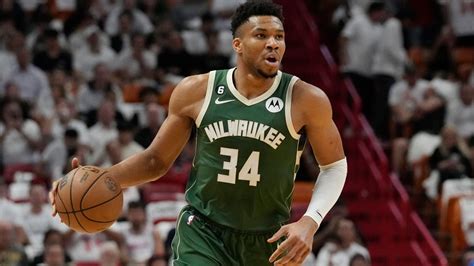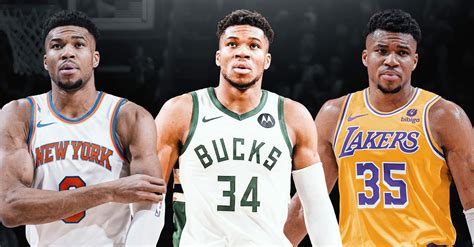
Milwaukee Bucks are reportedly prepared to explore trade options involving Giannis Antetokounmpo if he doesn’t sign a contract extension by the start of the upcoming season, signaling a potentially seismic shift in the NBA landscape.
The Bucks are facing mounting pressure to secure Antetokounmpo’s long-term commitment, and according to Yahoo Sports senior NBA reporter Jake Fischer, the organization is willing to consider trades to avoid the possibility of losing him for nothing in free agency. “The Bucks, sources said, would be open to exploring trade scenarios involving Antetokounmpo if he does not sign an extension this summer,” Fischer reported. This marks a significant departure from their previously unwavering stance of building around the two-time MVP at all costs. The team’s front office, now led by General Manager Jon Horst, is seemingly adopting a more pragmatic approach to ensure the franchise’s sustained competitiveness.
The pressure stems from the Bucks’ recent playoff failures, despite boasting a roster built to contend for championships. Antetokounmpo, who led the Bucks to their first NBA title in 50 years in 2021, is eligible for a contract extension this summer. However, with other superstars like Damian Lillard changing teams, the uncertainty surrounding Antetokounmpo’s future is amplified. His decision will not only dictate the Bucks’ trajectory but also send ripples throughout the league, influencing the strategies of numerous teams vying for championship contention.
The potential availability of a player of Antetokounmpo’s caliber on the trade market would trigger an unprecedented frenzy among NBA teams. His combination of size, athleticism, and skill makes him a unique and highly coveted asset. Any team acquiring him would instantly become a championship contender. Teams with ample assets, such as the Oklahoma City Thunder, New Orleans Pelicans, and potentially the New York Knicks, would likely be at the forefront of trade discussions. These teams possess a combination of young talent, draft picks, and established players that could entice the Bucks into a deal. The specific details of any potential trade package would be complex and would depend heavily on Antetokounmpo’s willingness to commit to his new team long-term.
The situation is further complicated by the evolving dynamics of the NBA’s collective bargaining agreement (CBA), which places increasing emphasis on team building and salary cap management. Teams are now more strategic than ever in acquiring and retaining star players, and the Bucks’ willingness to consider trading Antetokounmpo reflects this evolving landscape. The team understands the risk of losing him in free agency and is proactively exploring options to mitigate that risk. This decision underscores the high-stakes nature of NBA team management and the constant pressure to maintain a competitive edge.
The Bucks’ stance shift also comes after a disappointing first-round exit against the Indiana Pacers in the 2024 NBA playoffs, a series where Antetokounmpo was sidelined due to injury. This early exit raised questions about the team’s construction and its ability to compete at the highest level, even with Antetokounmpo on the floor. While the Bucks acquired Damian Lillard prior to the season to bolster their offensive firepower, the team struggled with consistency and defensive effectiveness throughout the year. The chemistry between Antetokounmpo and Lillard never fully materialized, contributing to the team’s underperformance.
The decision to potentially trade Antetokounmpo is undoubtedly a difficult one for the Bucks’ ownership and management. He has been the face of the franchise for over a decade and has brought unparalleled success to the city of Milwaukee. However, the team must also consider the long-term implications of potentially losing him for nothing. By exploring trade options, the Bucks are positioning themselves to potentially acquire a package of assets that could help them rebuild and remain competitive in the future. This is a delicate balancing act that requires careful consideration of all available options.
The next few months will be critical in determining Antetokounmpo’s future in Milwaukee. The Bucks will undoubtedly make a strong push to convince him to sign a contract extension. However, if he remains hesitant, the team will have to seriously consider its options. The potential trade of Giannis Antetokounmpo would be a landmark event in NBA history, reshaping the competitive landscape for years to come.
The pressure on the Bucks to secure Antetokounmpo’s commitment extends beyond just basketball considerations. The Greek Freak’s presence has significantly boosted the city of Milwaukee’s profile, attracting national and international attention. His marketability and endorsement deals have also contributed to the city’s economic growth. Losing him would undoubtedly have a negative impact on the local economy and the team’s fan base. This adds another layer of complexity to the decision-making process.
The potential trade destinations for Antetokounmpo are numerous, with several teams possessing the assets and cap space to make a compelling offer. The Oklahoma City Thunder, led by General Manager Sam Presti, have accumulated a treasure trove of draft picks and young talent. They could offer a package centered around players like Shai Gilgeous-Alexander, Chet Holmgren, and Jalen Williams, along with a plethora of future draft selections. This would provide the Bucks with a significant head start in their rebuilding efforts.
The New Orleans Pelicans, with their combination of Zion Williamson, Brandon Ingram, and a strong supporting cast, could also be a viable trade partner. They could offer a package that includes Ingram, draft picks, and potentially other assets to entice the Bucks. The Pelicans are looking to establish themselves as a perennial contender, and adding Antetokounmpo would undoubtedly accelerate their timeline.
The New York Knicks, under the leadership of President Leon Rose, have been patiently building their roster and accumulating assets. They could offer a package centered around RJ Barrett, Julius Randle, and a collection of draft picks. The Knicks are desperate to land a superstar and return to prominence, and Antetokounmpo would be a perfect fit for the New York market.
Other teams that could potentially be in the mix include the Golden State Warriors, who could offer a package centered around Jonathan Kuminga, and the Miami Heat, who have a history of attracting star players. The specific details of any potential trade would depend heavily on the Bucks’ priorities and the willingness of Antetokounmpo to commit to his new team long-term.
The uncertainty surrounding Antetokounmpo’s future has already had a ripple effect throughout the league. Teams are closely monitoring the situation and adjusting their strategies accordingly. The potential availability of a player of his caliber on the trade market would create unprecedented competition and could reshape the balance of power in the NBA.
The Bucks’ decision to consider trading Antetokounmpo underscores the ever-changing dynamics of the NBA. Teams are constantly evaluating their options and making strategic decisions to maximize their chances of success. The pressure to win is immense, and teams are willing to take calculated risks to achieve their goals.
The situation also highlights the importance of player empowerment in the modern NBA. Star players have more control over their destinations than ever before, and their decisions can have a profound impact on the league. Antetokounmpo’s decision will not only determine his own future but also influence the strategies of numerous teams vying for championship contention.
The next few months will be a period of intense speculation and negotiation as the Bucks and Antetokounmpo navigate this complex situation. The outcome will have significant ramifications for the NBA and will shape the league’s landscape for years to come.
The potential trade also raises questions about the legacy of Giannis Antetokounmpo in Milwaukee. He has already cemented his place as one of the greatest players in NBA history, and his contributions to the Bucks and the city of Milwaukee are undeniable. However, a trade could tarnish his legacy in the eyes of some fans, particularly if he goes on to win championships with another team.
On the other hand, a trade could also be seen as a mutually beneficial decision that allows both Antetokounmpo and the Bucks to move forward in a positive direction. Antetokounmpo could pursue his championship aspirations elsewhere, while the Bucks could acquire a package of assets that allows them to rebuild and remain competitive in the future.
Ultimately, the decision rests with Antetokounmpo and the Bucks’ ownership. They will have to weigh the pros and cons of all available options and make a decision that is in the best interests of both parties.
The situation also serves as a reminder of the transient nature of professional sports. Players come and go, and teams are constantly evolving. Even the most iconic players are not immune to the realities of the business, and their futures are often subject to uncertainty.
The potential trade of Giannis Antetokounmpo would be a watershed moment in NBA history, marking the end of an era in Milwaukee and potentially ushering in a new era of competition across the league. The next few months will be a period of intense drama and speculation as the NBA world waits to see what happens next.
The Bucks are likely operating under the assumption that an extension offer alone won’t be enough to retain Antetokounmpo, especially given the recent moves of other stars and the current state of the Bucks’ roster. They will need to demonstrate a renewed commitment to building a championship-caliber team around him. This could involve making strategic additions to the roster, improving the coaching staff, and addressing the team’s weaknesses.
However, even if the Bucks make significant improvements, there is no guarantee that Antetokounmpo will sign an extension. He may simply want to explore his options in free agency and see what other teams are willing to offer. He may also be seeking a change of scenery or a different basketball environment.
The Bucks’ willingness to consider trading Antetokounmpo is a reflection of the new realities of the NBA. Teams are no longer willing to hold onto star players at all costs, especially if they risk losing them for nothing in free agency. The focus is now on maximizing assets and ensuring that the team remains competitive in the long term.
The potential trade of Antetokounmpo would have a significant impact on the NBA’s television ratings and viewership. He is one of the league’s most popular and recognizable players, and his games draw large audiences. Losing him would undoubtedly hurt the Bucks’ television ratings, but it could also boost the ratings of his new team.
The situation also raises questions about the future of the Bucks’ ownership. The team is owned by a group of investors led by Wes Edens, Marc Lasry, Jamie Dinan, and Mike Fascitelli. They acquired the team in 2014 and have overseen a period of significant success, including the 2021 NBA championship. However, the potential loss of Antetokounmpo could put their ownership under scrutiny and could lead to changes in the team’s management.
The Bucks’ front office, led by General Manager Jon Horst, will be under immense pressure to navigate this situation effectively. They will need to make tough decisions that will shape the future of the franchise for years to come. Their ability to acquire a package of assets that can help the team rebuild and remain competitive will be crucial.
The situation also highlights the importance of communication and transparency between the team and its star players. The Bucks need to be honest with Antetokounmpo about their plans for the future and listen to his concerns. They need to work together to find a solution that is in the best interests of both parties.
The potential trade of Giannis Antetokounmpo is a complex and multifaceted situation that will have far-reaching consequences for the NBA. The next few months will be a period of intense drama and speculation as the league waits to see what happens next.
The ramifications of trading Antetokounmpo extend beyond the basketball court and into the realm of business and marketing. His presence in Milwaukee has attracted numerous corporate sponsors and partners, contributing significantly to the team’s revenue. A trade would undoubtedly lead to a reevaluation of these partnerships and could result in a decline in the team’s overall financial performance. The Bucks’ marketing strategy is heavily reliant on Antetokounmpo’s image and popularity, and his departure would require a complete overhaul of their branding efforts. The team would need to find new ways to attract fans and sponsors, which could be a challenging task in the short term.
Furthermore, the Bucks’ merchandise sales, which have skyrocketed since Antetokounmpo’s arrival, would likely take a significant hit. His jersey is consistently one of the best-selling in the NBA, and his signature shoes and apparel are highly sought after by fans. The team would need to identify new players to market and promote in order to maintain a strong merchandise presence. The economic impact of trading Antetokounmpo would be felt throughout the entire organization, from the front office to the ticket sales department.
The potential trade also raises questions about the future of the Fiserv Forum, the Bucks’ state-of-the-art arena that opened in 2018. The arena was built in part to accommodate the team’s growing fan base and to provide a world-class experience for fans. However, the loss of Antetokounmpo could lead to a decline in attendance and revenue, which could impact the arena’s long-term financial viability. The Bucks would need to find ways to attract fans to the arena even without Antetokounmpo, such as hosting concerts, events, and other sporting competitions.
The potential trade of Antetokounmpo also has implications for the city of Milwaukee’s reputation and image. He has become a symbol of the city’s resurgence and has helped to attract national and international attention. His departure could be seen as a setback for the city’s efforts to revitalize its economy and improve its quality of life. The city would need to find new ways to promote itself and attract investment, and it would need to continue to support the Bucks even without Antetokounmpo.
The situation also highlights the importance of building a strong and sustainable basketball program in Milwaukee. The Bucks need to invest in youth basketball programs and develop local talent in order to ensure that the team remains competitive in the long term. They need to create a pipeline of players who can eventually fill the void left by Antetokounmpo’s departure. This would require a long-term commitment to player development and a willingness to invest in the future of the sport in Milwaukee.
The potential trade of Giannis Antetokounmpo is a complex and multifaceted issue with far-reaching consequences for the Bucks, the city of Milwaukee, and the NBA. The next few months will be a period of intense scrutiny and speculation as the world watches to see what happens next.
Frequently Asked Questions (FAQ)
1. Why are the Bucks considering trading Giannis Antetokounmpo?
The Bucks are reportedly considering trading Giannis Antetokounmpo because he hasn’t signed a contract extension, and they want to avoid the risk of losing him for nothing in free agency. They are also looking to potentially acquire assets that could help them rebuild and remain competitive in the future. As reported by Jake Fischer of Yahoo Sports, “The Bucks, sources said, would be open to exploring trade scenarios involving Antetokounmpo if he does not sign an extension this summer.” This shift in strategy suggests a more pragmatic approach to team management after recent playoff disappointments.
2. What are the potential trade destinations for Antetokounmpo?
Several teams could be potential trade destinations, including the Oklahoma City Thunder, New Orleans Pelicans, and New York Knicks. These teams possess a combination of young talent, draft picks, and established players that could entice the Bucks into a deal. Other teams that might be in the mix include the Golden State Warriors and the Miami Heat. The specific details of any potential trade would depend heavily on the Bucks’ priorities and Antetokounmpo’s willingness to commit to his new team long-term.
3. What impact would trading Antetokounmpo have on the Bucks?
Trading Antetokounmpo would have a significant impact on the Bucks, both on and off the court. The team would lose its franchise player and one of the best players in the NBA. This could lead to a decline in the team’s competitiveness, television ratings, and merchandise sales. However, the Bucks would also acquire a package of assets that could help them rebuild and remain competitive in the future. The success of the trade would depend on the quality of the assets acquired and the team’s ability to develop those assets into future stars.
4. What does this situation say about player empowerment in the NBA?
This situation highlights the importance of player empowerment in the modern NBA. Star players have more control over their destinations than ever before, and their decisions can have a profound impact on the league. Antetokounmpo’s decision will not only determine his own future but also influence the strategies of numerous teams vying for championship contention. The Bucks’ willingness to consider trading him underscores the new realities of the league, where teams are increasingly willing to accommodate the wishes of their star players.
5. What is the timeline for a decision on Antetokounmpo’s future?
The next few months will be critical in determining Antetokounmpo’s future in Milwaukee. He is eligible for a contract extension this summer, and the Bucks will undoubtedly make a strong push to convince him to sign it. If he remains hesitant, the team will have to seriously consider its trade options. The situation could come to a head before the start of the next NBA season, as the Bucks would likely want to resolve the uncertainty before the season begins. The urgency is driven by the desire to avoid Antetokounmpo potentially leaving in free agency without the team receiving any compensation.
Expanding on the Ripple Effects
Beyond the immediate basketball and financial implications, the potential departure of Giannis Antetokounmpo from Milwaukee has far-reaching effects on the city’s identity and the psychological connection between the team and its fans. Antetokounmpo’s journey from a relatively unknown international prospect to a two-time MVP and NBA champion is deeply intertwined with the story of Milwaukee’s own revitalization. His success became a symbol of the city’s potential, a narrative of hard work, dedication, and unexpected triumph.
Losing him would not only mean losing a superstar player but also severing a powerful emotional bond that has been cultivated over years. For many Milwaukeeans, Antetokounmpo represents more than just a basketball player; he embodies the spirit of the city – its resilience, its blue-collar work ethic, and its unwavering belief in the possibility of achieving greatness despite the odds.
The impact on the fan base could be profound. A trade could lead to widespread disillusionment, decreased ticket sales, and a general sense of apathy towards the team. Building a new connection with a different group of players would take time and effort, and the emotional investment that fans have made in Antetokounmpo’s story would be difficult to replicate. The Bucks’ management would face the daunting task of not only rebuilding the roster but also rebuilding the emotional connection with the community.
Furthermore, Antetokounmpo’s presence has helped to attract a more diverse fan base to the Bucks. His international background and his commitment to community engagement have resonated with people from all walks of life. His departure could lead to a decline in diversity among the team’s fan base, which would be a significant loss for the organization.
The potential trade also raises questions about the Bucks’ commitment to long-term stability and sustainability. The team has invested heavily in its infrastructure, including the Fiserv Forum and the Froedtert & the Medical College of Wisconsin Sports Science Center. These investments were made with the expectation that Antetokounmpo would be a cornerstone of the franchise for many years to come. His departure could force the team to reevaluate its long-term plans and make difficult decisions about its future investments.
The Bucks’ management would need to communicate clearly and transparently with the fans about the team’s direction and its commitment to remaining competitive. They would need to demonstrate a clear plan for rebuilding the roster and developing new stars. They would also need to emphasize the team’s commitment to the community and its continued investment in youth basketball programs.
Ultimately, the potential trade of Giannis Antetokounmpo is a complex and emotional issue that will have far-reaching consequences for the Bucks, the city of Milwaukee, and the NBA. The next few months will be a test of the team’s leadership, its commitment to the community, and its ability to navigate a difficult and uncertain future. The outcome will shape the legacy of the Bucks for years to come.









